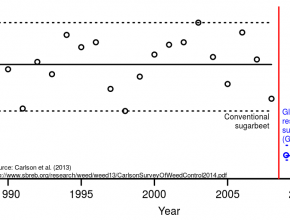GMOs and Herbicides: it’s complicated
Herbicide use patterns in the US have changed a lot over the last 25 years. Depending on who you talk to, those changes are either proof that modern American agriculture will feed the world with fewer inputs, or proof that the US agricultural system is irreparably broken. There seems to be no middle ground in this discussion. Herbicide use is especially controversial when discussed in the context of genetically engineered crops (often called GMOs, for genetically modified organisms). The most …
GMOs and Herbicides: it’s complicated Read More
